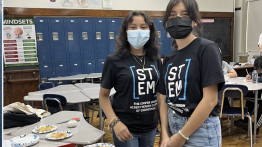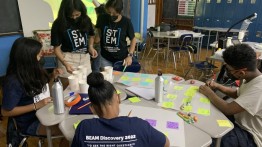Summer STEM's First Service Scholars Wrap Up Successful Community Projects
POSTED ON: September 12, 2022
This summer, the Cooper tradition of offering free or low-cost opportunities to New York City students continued with this year’s Summer STEM program—but this time geared towards community service. Four high school students—the STEM program’s first class of Service Scholars—were part of projects that encouraged Black home ownership and led 6th graders in conducting engineering experiments. Under the direction of Dr. Elizabeth Waters, the Service Scholars is a program that allows students who participate in Cooper’s Summer STEM program to sharpen their engineering knowledge and begin to develop leadership and communication skills, all while connecting to communities around New York. Tenth and eleventh grade self-identified girls in New York City high schools who already had experience in a STEM program, whether Cooper’s own STEM Saturdays or other programs like Girls Who Code. “It was a very successful summer for demonstrating how engineering can have a direct impact on social justice,” said Waters.
Students partnered with two groups: DIVAS (Digital Interactive Visual Arts Sciences) for Social Justice, a group based in Brooklyn that uses technology to foster social change; and Bridge to Enter Advanced Mathematics (BEAM), a group that uses hands-on, collaborative projects to teach math skills.
Two of the Service Scholars, Stephanie Francisco and Ashley Roman, were charged with creating lesson plans for 6th graders in DIVAS afterschool school programs introducing them to engineering and storytelling tools, including augmented reality, for their exploration of the Black Homeowner Project, an initiative of the Center for NYC Neighborhoods, with support from the ABNY Foundation. The project’s goal is to highlight the obstacles faced by Black New Yorkers when buying a house and the advantage of home ownership for the next generation’s financial stability. In addition, when the Scholars visited DIVAS’ Garden of Resilience in Queens, they identified a problem that they could solve with their engineering skills: DIVAS’ garden housed laser-cut QR codes that let visitors hear stories from neighbors. But over time the QR codes had faded. The team brainstormed ways to protect the QR codes and decided that if they built birdhouses with front openings for the garden, they could keep the QR codes inside and unharmed by bad weather. Via the codes, visitors will be able to listen to recordings that will be made by elementary and middle school students as they consider what they think is important about a house. “In September, STEM will help DIVAS develop a pattern for laser cutting the houses that they can cut on their laser cutter. We’ll also be manufacturing houses at Cooper to get them ready for students to use,” says Waters. These houses will also be on display at the Rockefeller Center Back-to-School Fair on Saturday, September 24th.
This year’s two other Service Scholars, Samara Hayes—a rising senior at NYC iSchool—and Jamie Sarmiento—a rising junior at The Young Women’s Leadership School in Astoria—assisted at BEAM’s summer camp for middle school math students. Samara and Jamie taught 6th graders strategies for solving interesting engineering design challenges while elucidating math concepts and encouraging the students to work with each other. It was the first time either girl had taught. “It’s fulfilling to help people while you’re learning,” Samara said.
She recalled how both exciting and rigorous the interview process for the Service Scholars program had been. “The interviewers made us create a sketch for backpack for environmental scientists working in wildlife. We only had 15 minutes! We came up with a camouflage bookbag with a tent and a load of pockets. There was also a tube that would let the scientists take sips from their water bottle without having to take them out.” She loved the interview process and found that being a Service Scholar was just as creative. It also helped her become a better leader, a skill she had set out to improve at the beginning of the summer.
Ashley Roman, a rising junior at The Young Women’s Leadership School of Astoria had taken a class in augmented reality at Cooper’s Saturday STEM program earlier in the year. She was so taken with the subject that she wanted to apply what she’d learned to service project for DIVAS. “One of our first ideas was to teach children how to code to make an augmented world of their home,” Ashley said. But she and Stephanie soon realized that that was too much to take on with student who had never coded before. In the end, they revised their plan to teach the children the basics of coding. Ashley was thrilled with the results and found much gratification in teaching and opening up a new world to the students. “At the very least [our class] could lead to them joining the Saturday program at Cooper when they get the chance.”
In a debriefing session after the summer program ended, Clarisa James, DIVAS co-founder and executive director, said she was impressed with the way that the STEM Scholars jumped right into the challenge and were confident enough to immediately take chances. Stephanie noted that she’d learned that failure is only a steppingstone to doing better work as long as she remained flexible. “Don’t get too attached to one idea,“ she said. Ashley pointed out that her past experience in Cooper’s STEM program for high school students was a great help in preparing her to teach.
By the summer’s end, all four young women had gained a lot of confidence, much of which came from experimenting with their approaches to problem solving. Stephanie said that if she were to give advice to a future STEM Scholar it would be to not “be afraid to get out of your comfort zone.” Jamie’s advice to new students was succinct: “Don’t underestimate yourself.”
The STEM Service Scholars Program was launched with funding from our sponsors:
Cross Ridge Foundation
John Patrick Dugan






